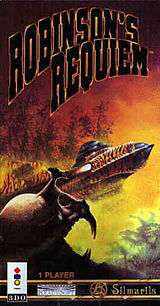Robinson's Requiem
| Robinson's Requiem | |
|---|---|
 | |
| Developer(s) | Silmarils |
| Publisher(s) | ReadySoft |
| Platform(s) | PC, 3DO, Atari Falcon, Atari ST, Amiga |
| Release date(s) | 1994 |
| Genre(s) | survival simulation |
| Mode(s) | Single-player |
Robinson's Requiem is a 1994 survival simulation game developed by Silmarils and published by ReadySoft.[1] The game has one sequel, Deus, released in 1996.
The game was released for PC, Atari Falcon, Atari ST, and Amiga. It was also ported to the home console 3DO. This version was originally announced for a February 1995 release,[2] but due to extensive delays was not released until 1996, becoming one of the last games released for the system. A version for the Jaguar CD was also developed, but canceled, though it finally received a homebrew release in 2011.
Story
The spacecraft of Officer Trepliev, a member of the fictional Alien World Exploration (AWE) department, is sabotaged to crash land on a prison planet called Zarathustra.[3][4]
Gameplay
The player has to explore and survive in a hostile alien environment, while using the game's systems to monitor the player character's health status, perform surgery and create makeshift tools.
Reception
| Reception | ||||||||||||||||
|---|---|---|---|---|---|---|---|---|---|---|---|---|---|---|---|---|
| ||||||||||||||||
Critical reception of Robinson's Requiem was mixed. Many reviewers noted its poor graphics and high system requirements, and some found the game to be boring. However, several critics, including those from CU Amiga and Amiga Computing, believed that the game's originality overrode other complaints.
CU Amiga's Tony Dillon was impressed by its freeform item combination system, but was disappointed by the Amiga version's graphics and performance. However, he finished his review by saying, "If you want something new that will completely blow your brain, then this could well be the game for you".[6] Jonathan Maddock of Amiga Computing also disliked the game's graphics and system requirements, but praised the game as "an entirely new gaming experience".[7] Amiga Format's Dale Bradford noted that "just wandering around, exploring and discovering how long you can stay alive is enjoyable, thanks to the non-linear gameplay", and to the "care and thought" that went into the game.[4] All three reviewers noted the game's high level of difficulty.[6][7]
Rich Pelley of Amiga Power, however, found the game to be extremely boring; he likened playing it to "being told to paint a fence and [...] discover[ing that] it's fifteen miles long". He also criticized its graphics and performance, and noted that the game's survival systems amounted to "lots of bars and charts and electrocardiograms, and not much action".[8] The game also received poor reviews from both PC Gamer UK and PC Gamer US, who found the game frustrating and uninviting, and criticized its graphics.[1][5]
Notes
- 1 2 3 "Robinson's Requiem". PC Gamer US. October 1994. Archived from the original on January 18, 2000. Retrieved October 13, 2010.
- ↑ "Quick Hits". GamePro (65). IDG. December 1994. p. 275.
- ↑ Wolf, Scott (April 1997). "Deus". PC Gamer US. Archived from the original on November 15, 1999. Retrieved October 14, 2010.
- 1 2 Bradford, Dale (November 1994). "Robinson's Requiem". Amiga Format (65): 68.
- 1 2 Burton, Chris. "Lost". PC Gamer UK. Archived from the original on March 14, 2002. Retrieved October 13, 2010.
- 1 2 3 Dillon, Tony (November 1994). "Robinson's Requiem". CU Amiga: 71, 72.
- 1 2 3 Maddock, Jonathan (December 1994). "Robinson's Requiem". Amiga Computing (85): 135.
- 1 2 Pelley, Rich (November 1994). "Robinson's Requiem". Amiga Power (43): 54.